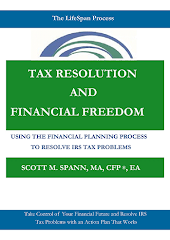
Whether you are working with a professional or creating your own financial plan, a comprehensive list of goals and objectives is an important starting point in the establishment of a tax and financial plan. Many people make the mistake of jumping into certain aspects of the financial planning process without a clear sense of direction. Even if you are not working with a planner you should start the planning process with specific goals and objectives.
First, start by making a comprehensive list of the things you would like money to help you accomplish in life. Then rank these goals and objectives from the most important to the least important. Establishing personal goals and objectives is your opportunity to identify what is most important to you. There are no right or wrong answers! This may seem like an easy step. However, this step should not be neglected. Goal setting will help define what you look to accomplish during the financial life planning process.
The following are some of the most common tax and financial planning goals that people generally set. I encourage people to be honest with themselves when ranking goals and objectives. Do not feel constrained by this list by any means. Add your own goals if this list does not include an important area of concern in your life.
Rank from 1 (most important) to 12 (least important).
Level of Importance Tax and/or Financial Planning Goal
______ Complete a planned major purchase (home, rental property, automobile, boat)
______ Increase Net Worth through, savings, investments
______ Establish a debt reduction plan to manage consumer debt
______ Manage income and expenses to maintain good cash flow
______ Minimize current income taxes
______ Ensure a comfortable retirement with income to maintain desired lifestyle
______ Provide education funds for children or grandchildren
______ Maximize the benefits of owning a business, provide for business continuation
______ Provide cash and income for survivors in the event of death
______ Protect assets and income against loss in the event of disability
______ Protect property from loss by natural or legal disaster
______ Pass money and property on to the next generation, minimize potential death taxes
______ Achieve Other Goals (Be Specific). Examples include: change jobs, career change, self-employment, learn a new skill or hobby, lose weight, improve physical fitness.
Life Planning Goals
Next, try to set goals that go beyond the traditional areas of focus listed above. These financial life planning goals should tap into your passions and values. These goals provide deeper meaning and purpose to the entire financial planning process.
Life planning goals generally fall into seven different categories. Take a moment and write down your life goals for each of these areas.
• Family
• Career
• Social
• Physical
• Spiritual
• Financial
• Intellectual
Other goals: ____________________________
After you have ranked your goals and their level of importance take the top three and write them down. Make sure that your goals are SMART and follow the guidelines below.
How SMART are your goals?
S = Specific (Be clear and precise)
M = Measurable (Identify how will you measure progress and success)
A = Attainable (Set goals that you are capable of accomplishing)
R = Realistic (Know your limitations but never underestimate your own abilities)
T = Timely (Set a time frame regarding when you would like to accomplish your goals)
The Three Most Important Goals in My Life
1.
2.
3.
Financial life planning goals focus on the “big picture” and provide a deeper meaning to the tax and financial planning process. Focusing on improving your life as it relates to money is the real challenge that you should be called to achieve. This means finding ways to understand how smart money related decisions will have an impact on your life plan. As this exercise should have demonstrated, smart decisions regarding money matters are guided by the establishment of "SMART" goals.
Financial life planning requires a focus on what matters to you the most in life. It starts the thinking process about what is important to you about money. When establishing tax and financial goals you should consider the role that money plays in your life. That is the "smart" way to approach the financial planning process.






